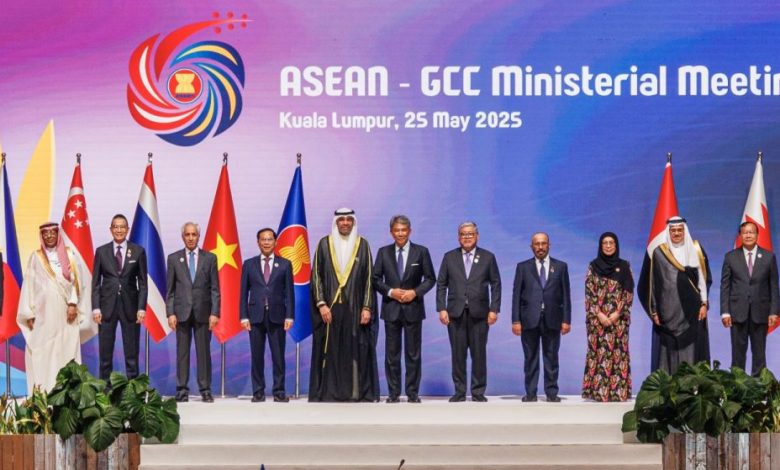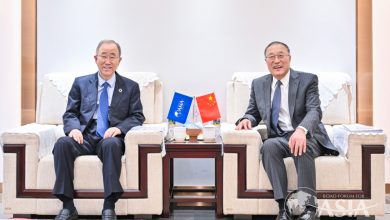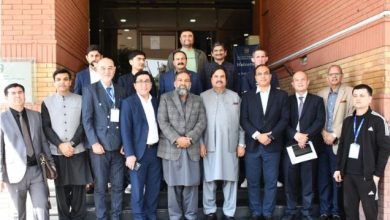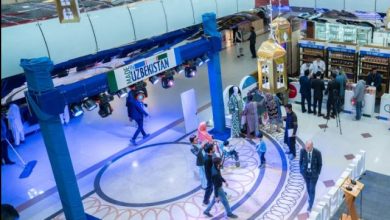ASEAN Summits in Malaysia Steer Cooperation in Global South

ASEAN Summits in Malaysia Steer Strategic Cooperation in Multipolar World
Malaysia Hosts leaders of Multipolar World under ASEAN-Gulf Cooperation Council (GCC)-China Summit to Advance Inter-Regional Cooperation
Leaders from Southeast Asia, the Gulf, and China who gathered in iconic capital, Kuala Lumpur to explore new avenues for economic and strategic cooperation in diverse sectors.
By: Muhammad Arif, Editor NSN.Asia
Islamabad: Malaysia’s iconic capital, Kuala Lumpur, hosted the first-ever ASEAN (Association of Southeast Asian Nations)-GCC (Gulf Cooperation Council)-China Summit themed “Inclusivity and Sustainability” on May 27, 2025.
ASEAN -GCC-China Summit, serving as strategic platform to advance regional and inter-regional cooperation, was attended by the leaders from Southeast Asia, the Gulf, and China who gathered here to explore new avenues for economic and strategic collaboration in diverse sectors.
Cooperation and connectivity, the spirit of Silk Road, was the driving force behind this trilateral momentum.
The ASEAN-Gulf Cooperation Council (GCC)-China Summit symbolises the power of cohesiveness of regional blocs which would have a positive impact on the world at large, Prime Minister Datuk Seri Anwar Ibrahim said at the Summit.


Anwar, who is also Finance Minister, said the 57-year old grouping should ensure that the ASEAN-GCC-China geo-economic model continues to play a meaningful role in forging a more inclusive and sustainable future, for the region and the people.
The ASEAN Summit in Malaysia brings together leaders from member states to deliberate on regional developments and chart the future direction of the regional grouping.
Head of States that were present were Sultan of Brunei Sultan Hassanal Bolkiah, Indonesia’s President Prabowo Subianto, Cambodia’s Prime Minister Hun Manet, Laos’ Prime Minister Sonexay Siphandone, Vietnam’s Prime Minister, Pham Minh Chinh, Philippine President Ferdinand Marcos Jr., Singapore’s Prime Minister Lawrence Wong and Thailand’s Prime Minister Paetongtarn Shinawatra.
Timor Leste’s Prime Minister Xanana Gusmão as Observer, and ASEAN’S Secretary-General Dr Kao Kim Hourn were also present.
This year marks Malaysia’s fifth time chairing the regional bloc, having previously held the ASEAN chairmanship in 1977, 1997, 2005, and 2015.
In conjunction with the summit, two pivotal high-level engagements, namely the 2nd ASEAN-GCC Summit and the inaugural ASEAN-GCC-China Summit, were be convened, serving as strategic platforms to advance regional and inter-regional cooperation.
In his remarks on the success of summit, the Prime Minister’s senior press secretary Tunku Nashrul Abaidah said that this trilateral summit symbolises the strength of regional bloc unity, and is expected to have a positive impact on the world as a whole.
“Today sees a major focus on strengthening Asean cooperation with strategic partners through the hosting of the 2nd Asean-GCC Summit and the inaugural Asean-GCC-China trilateral summit.
“Both summits will discuss concrete steps to expand cooperation in trade, investment, and sustainable development, in line with Asean’s aspiration to play a larger role in the Indo-Pacific geoeconomic landscape,” he said.
He made these remarks during the Daily Briefing of the Prime Minister’s Office (PMO), which was broadcast via the Facebook pages of Anwar Ibrahim and PMO Malaysia on Tuesday.
For the record, the combined economic scale of Asean, GCC, and China now reaches nearly US$25 trillion (RM104 trillion), with a population exceeding two billion people.
Asean is currently the world’s fifth-largest economy with a Gross Domestic Product (GDP) of US$3.8 trillion (RM15.9 trillion), while China remains Asean’s largest trading partner with bilateral trade amounting to US$696.7bil (RM2.9 trillion).
ASEAN-GCC-China Summit 2025: A New Era of Strategic Cooperation
The ASEAN-GCC-China Summit 2025, held in Kuala Lumpur, Malaysia, marked a significant milestone in global diplomacy, bringing together leaders from Southeast Asia, the Gulf Cooperation Council (GCC), and China to discuss economic collaboration, geopolitical strategy, and sustainable development.
A Historic Gathering of Global South Leadership in Malaysia
This inaugural trilateral summit signaled a shift in global alliances, as ASEAN expands its diplomatic reach beyond traditional partners. Malaysia, as the ASEAN Chair for 2025, played a pivotal role in hosting the event, emphasizing inclusivity and sustainability as key themes. The summit also coincided with the 46th ASEAN Summit and the 2nd ASEAN-GCC Summit, reinforcing the region’s commitment to fostering deeper inter-regional ties.
Economic Aspirations and Strategic Ambiguity
The summit’s agenda focused on economic cooperation, particularly in trade, investment, and infrastructure development. Malaysian Prime Minister Anwar Ibrahim highlighted the importance of strengthening relationship with China and the GCC countries, citing opportunities in green energy, artificial intelligence, and the halal industry. The summit also underscored ASEAN’s strategic relevance in a multipolar world, as the grouping seeks to diversify economic partnerships amid shifting global dynamics.
The ASEAN-Gulf Cooperation Council (GCC)-China Summit symbolized the power of cohesiveness of regional blocs which would have a positive impact on the world at large, Prime Minister Datuk Seri Anwar Ibrahim said in his remarks at Summit.
Anwar, who is the current Chair of ASEAN, said the unity between them manifests the successful reshaping of regional partnerships in response to the evolving dynamics of a multipolar world.
“ASEAN member countries must preserve the multilateral system,” he said in his opening remarks at the 46th ASEAN Summit and related meetings.
China’s Expanding Influence in Global South
Chinese Premier Li Qiang arrived in Kuala Lumpur to attend the summit, reaffirming China’s commitment to regional collaboration. His presence signaled Beijing’s growing influence in Southeast Asia and the Gulf, as China continues to position itself as a key player in global trade and infrastructure development. The summit provided a platform for China to strengthen its economic and diplomatic ties with ASEAN and GCC nations, further integrating the region into Beijing’s broader strategic vision.
Chinese Premier Li Qiang met with Sheikh Sabah Al-Khaled Al-Hamad Al-Sabah, crown prince of Kuwait, on the sidelines of the ASEAN (the Association of Southeast Asian Nations)-GCC (the Gulf Cooperation Council)-China Summit.
Chinese Premier Li Qiang said on Monday that China looks forward to strengthening communication and cooperation with countries of the Gulf Cooperation Council (GCC) and the Association of Southeast Asian Nations (ASEAN) to promote peace, prosperity, stability and connectivity in Asia, and make positive contributions to upholding the interests of the Global South.
China stands ready to work with Kuwait to strengthen the synergy between the Belt and Road Initiative and Kuwait Vision 2035, expanding the scope of cooperation and accelerating the implementation of major cooperative projects, Li said.
China is willing to deepen cooperation with Kuwait in such fields as energy, investment, green economy, digital economy and artificial intelligence, so as to open up new space for win-win cooperation and contribute to each other’s development and revitalization, Li said.
Against a turbulent international landscape marked by rising unilateralism and protectionism, Li said, China is committed to strengthening communication and coordination with Kuwait through such multilateral platforms as the United Nations, China-GCC, the Shanghai Cooperation Organization and the Conference on Interaction and Confidence-Building Measures in Asia to push for more just and equitable global governance and promote harmony, stability and prosperity for the whole world.
In his remarks, Al-Sabah said that Kuwait and China enjoy a profound traditional friendship, noting that under the strategic guidance of the heads of state of the two countries, Kuwait-China relations have shown a good momentum of development.


The Kuwaiti side attaches great importance to developing relations with China, and is willing to work with China to actively implement the important consensus reached by the heads of state of the two countries, tap the potential for cooperation, expand areas of cooperation, deepen mutually beneficial cooperation, and strengthen people-to-people and cultural exchanges, he said.
Kuwait is also ready to work with China to promote cooperation between the GCC and China, enhance communication and coordination on regional and multilateral affairs, so as to push bilateral relations to a higher level, he added.
The Chinese premier arrived in Kuala Lumpur earlier Monday to attend the ASEAN-GCC-China Summit.
Cultural Diplomacy and Soft Power
Beyond economic discussions at ASEAN-GCC-China Summit, Malaysia leveraged the summit to showcase its cultural heritage, with traditional performances, art exhibitions, and culinary experiences enriching the diplomatic atmosphere. The event highlighted Malaysia’s ability to blend soft power diplomacy with high-level negotiations, reinforcing its role as a bridge between ASEAN, the GCC, and China.
ASEAN-GCC-China Summit 2025 concluded with the Kuala Lumpur Declaration on ASEAN 2045, comprising six core documents:
- The Kuala Lumpur Declaration on ASEAN 2045: Our Shared Future
- Asean Community Vision (ACV) 2045 — Resilient, Innovative, Dynamic and People-Centred Asean
- Asean Political-Security Community Strategic Plan
- Asean Economic Community Strategic Plan 2026–2030
- Asean Socio-Cultural Community Strategic Plan
- Asean Connectivity Strategic Plan
Impact of ASEAN-GCC-China Summit on Emerging Asia
While the ASEAN-GCC-China Summit set the stage for deeper cooperation, questions remain about the long-term implications of this trilateral partnership. Will ASEAN maintain its centrality in global affairs, or will it be overshadowed by larger geopolitical forces? The success of this summit will depend on how effectively ASEAN, the GCC countries, and China navigate their economic and strategic interests in the years ahead.


As the world watches, the ASEAN-GCC-China Summit 2025 may well define the future of inter-regional collaboration, shaping the next phase of global economic and diplomatic relations.





